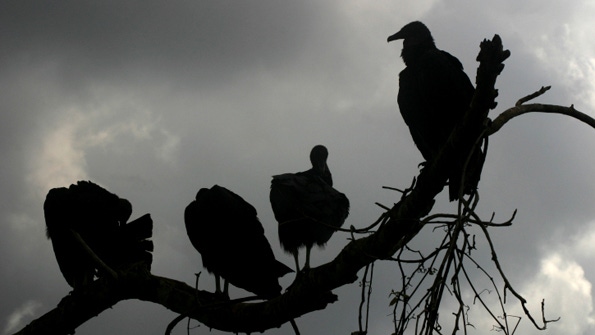Meetings with officials hope to institute changes to allow for cattle producers to protect their herds.
July 19, 2019

Missouri Cattlemen's Assn. (MCA) executive vice president Mike Deering said countless members have contacted the association about the growing difficulty with black vultures.
Leaders from MCA traveled to Washington, D.C., July 16, 2019, to meet with officials from the U.S. Fish & Wildlife Service (FWS), the U.S. Department of Agriculture’s Animal Plant & Health Inspection Service (APHIS), Rep. Jason Smith (R., Mo.) and congressmen from three other states about problems producers are facing with the increasing presence of black vultures, often referred to as black headed buzzards. MCA Region 3 vice president Charlie Besher, who attended the meeting, said the problem is becoming a crisis.
APHIS attributes around $5 million in losses to the vultures, but that number is likely much higher, according to Deering, given that many deaths go unreported. The bird has become a problem in recent years as a result of an exploding population and a drastic change in their migratory pattern. Many argue that the birds have all but stopped migrating because they see the birds year-round.
We've had calves killed on our farm and know many producers from my area who have been battling these birds for a few years now," said Besher, who lives in southeast Missouri. "We need commonsense solutions to deal with this predator that is killing cattle not only in my region but throughout the state. We want to be partners with the agencies when it comes to cattle producers protecting their private property and their livelihood."
MCA was alongside leaders of the Arkansas Cattlemen's Assn. and the Mississippi Cattlemen's Assn. in asking officials to work with them on a solution. The difficult hurdle is that these birds are protected by the Migratory Bird Treaty Act of 1918, making it a crime for farm and ranch families to protect their livestock without a permit that takes weeks to months to obtain, since producers are required to count birds and first try non-lethal means of discouraging the birds.
"It's bizarre and almost unbelievable to many who aren't directly impacted by these birds that have transformed from scavengers into violent predators," Deering said. "The black vultures hang out primarily during calving season and swoop down after the baby calf, poking the calf's eyes out to disable it and then going in for the kill usually starting on the backside of the calf. It's a vicious attack and a painful death for the animal. Reports have been made of the birds also attacking full-grown cows and older calves as well."
Leaders from APHIS and FWS acknowledged the problem and expressed a desire to address it. Mike Oetker, FWS deputy regional director in the Southeast Region, reported the bird's population to be around 4.3 million, with only 4,700 permits being issued in12 states. Deering said the number of kills is not making a dent in the population.
"We stated clearly that legislation is not necessary, and many changes could be made quickly by USFWS with policy changes or possibly rule-making. Oetker and other USFWS officials agreed," Deering said. "The meeting was positive with USFWS and USDA-APHIS agreeing to communicate clearly with stakeholders and pursue changes to allow for a quicker permitting process without unnecessary bureaucracy. They also noted it is highly likely they can proactively issue permits before there are dead calves."
Deering said the association appreciates the candid dialogue but will not settle until commitments become reality.
You May Also Like



